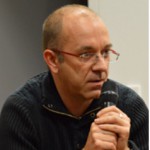In the frame of IMS and CEFRES’s common seminar “Between Disciplines and Areas”, Barbora Mencová (FSV UK) will present her work on Czechoslovak-Portuguese relations in 1960-1980.
Where: CEFRES library, Na Florenci 3.
Language: English.
In the frame of IMS and CEFRES’s common seminar “Between Disciplines and Areas”, Barbora Mencová (FSV UK) will present her work on Czechoslovak-Portuguese relations in 1960-1980.
Where: CEFRES library, Na Florenci 3.
Language: English.
Session led by Mátyás Erdélyi.
The present seminar session investigates how social statistics were created, comprehended, and used for commercial and public purposes in Dualist Hungary. It explores different modes of quantification, the inter- or pre-disciplinary sights of scientific production, and power relations between competing expert and nascent professions. Central to this line of inquiry is the investigation of relations between statisticians and other notables (i.e. every person worth of attention and involved in the debate, be it a politician, businessman, any type of scholar) inclined to claim authority over the creation and political/economic use of social statistics. This session contributes to the overall discussions on the nature of interdisciplinarity by describing primeval workshops on interdisciplinarity and by showing how the search for timeless truths and objectivity can be deviated by political and economic interests amidst disciplinary competition.
Readings:
Session led by Edita Wolf.
Session led by Monika Brenišínová.
Readings
In various theoretical discussions on architecture, we may notice that there is not a singular way of approaching it. From the classical perspective of the history of art classical art historical perspective, it is possible to identify at least three basic methods of inquiry: archaeological building survey („Bauforschung“, A. von Gerkan, in Czech “SHP”, D. Líbal); style-critical and style-historical analyses (H. Wölfflin, H. Focillon, M. Dvořák); semantic analysis (G. Passavant, E. Hubala). When we consider art in general, things however get even more complicated. If we take into account the fact that even among historians of art a consensus about the definition of art as such does not exist, what will happen when we will look at art from the perspective of another scientific discipline? When we conceive art as an historical source, traditional art historical categories such as the aesthetic point of view, the author’s fantasy, the styles or commonplaces (loci communes) quickly lose their significance. Moreover, historical work with visual sources is largely interpretative and requires a significantly critical approach. Thus we suddenly find ourselves on the borders of humanities and social sciences. And it is exactly such space, outside the frontiers of clearly defined disciplines, where the space and time change their shapes and where other disciplines – such as anthropology – can be brought into play.
The IMS-CEFRES seminar “Between Areas and Disciplines” will host post-doctoral researcher Adrian Brisku (FSV UK), who will present his work on Political Economic Thought, Empire, and Nation-State – The Cases of Albania, Czecho/Slovakia and Georgia, c. 1880s to 1920s.
 His presentation will be discussed by French historian Xavier Bougarel (CETOBAC-EHESS and Marc Bloch Center, Berlin).
His presentation will be discussed by French historian Xavier Bougarel (CETOBAC-EHESS and Marc Bloch Center, Berlin).
The seminar will be held in English.
Place: Jinonice, room 1037.
The IMS-CEFRES seminar “Between Areas and Disciplines” will host
Martin MICHELOT (FSV UK)
who will present his work on
“Regional Security Cooperation Arrangements in Europe: Building Europe, Strengthening Transatlantic”
The presentation will be discussed by Tomaš Weiss PhD. (IMS FSV).
The seminar will be held in English.
Venue: IMS FSV UK, U kříže 8/661, Prague 5, room 1037
Contact: Paul Bauer paul.bauer@fsv.cuni.cz & Clara Royer clararoyer@cefres.cz